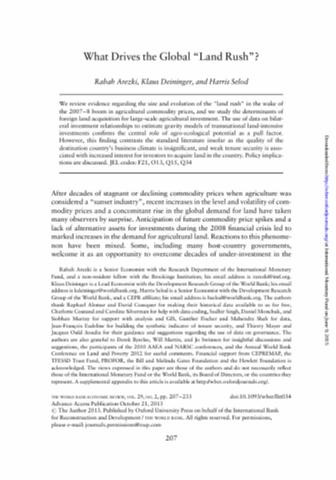The World Bank is a vital source of financial and technical assistance to developing countries around the world. We are not a bank in the ordinary sense but a unique partnership to reduce poverty and support development. The World Bank Group has two ambitious goals: End extreme poverty within a generation and boost shared prosperity.
- To end extreme poverty, the Bank's goal is to decrease the percentage of people living on less than $1.25 a day to no more than 3% by 2030.
- To promote shared prosperity, the goal is to promote income growth of the bottom 40% of the population in each country.
The World Bank Group comprises five institutions managed by their member countries.
The World Bank Group and Land: Working to protect the rights of existing land users and to help secure benefits for smallholder farmers
The World Bank (IBRD and IDA) interacts primarily with governments to increase agricultural productivity, strengthen land tenure policies and improve land governance. More than 90% of the World Bank’s agriculture portfolio focuses on the productivity and access to markets by small holder farmers. Ten percent of our projects focus on the governance of land tenure.
Similarly, investments by the International Finance Corporation (IFC), the World Bank Group’s private sector arm, including those in larger scale enterprises, overwhelmingly support smallholder farmers through improved access to finance, inputs and markets, and as direct suppliers. IFC invests in environmentally and socially sustainable private enterprises in all parts of the value chain (inputs such as irrigation and fertilizers, primary production, processing, transport and storage, traders, and risk management facilities including weather/crop insurance, warehouse financing, etc
For more information, visit the World Bank Group and land and food security (https://www.worldbank.org/en/topic/agriculture/brief/land-and-food-security1
Resources
Displaying 821 - 825 of 4906Disaster Risk Management in the Transport Sector
Natural hazards regularly impact the performance of
transport systems and their ability to provide safe,
reliable, efficient, and accessible means of transport
for all citizens, especially in emergency situations.
Despite the frequency of natural hazards, and the
threat of more extreme and variable weather as a
result of climate change, there is still no systematic
approach to addressing natural disasters in the
transport sector and there is little knowledge that has
been disseminated on this topic. This report offers a
What Drives the Global “Land Rush”?
We review evidence regarding the size and evolution of the "land rush" in the wake of the 2007–8 boom in agricultural commodity prices, and we study the determinants of foreign land acquisition for large-scale agricultural investment. The use of data on bilateral investment relationships to estimate gravity models of transnational land-intensive investments confirms the central role of agro-ecological potential as a pull factor.
Where are Iraq’s Poor?
Measuring poverty and tracking it over
time is an important prerequisite to national economic
planning. Absence of official data on household expenditure
or poverty line hampered the ability of Iraqi policymakers
to understand the extent of the problem, analyze their
causes, and devise appropriate policies. Iraq household
socioeconomic survey (IHSES) 2006-07 was the first survey of
its kind since 1988 to cover all 18 governorates. The survey
Social Compact in Electricity Privatization in Southeastern Turkey
About 70 percent of electricity users in
Southeastern Turkey are not used to paying for electricity,
partially due to the protracted situation of conflict and
lack of trust between citizens and the government in the
region. Historic tension throughout the 1990s caused an
inability for the government to invest in electricity
infrastructure and has resulted in low service quality. A
large portion of consumers did not pay for electricity use
The Quality of Results Frameworks in Development Policy Operations
The objective of this review is to
synthesize existing evaluative evidence and generate new
evidence on the quality of the Results Frameworks (RFs) of
development policy operations (DPOs). The study is organized
around a number of evaluative questions on various aspects
of DPO design, implementation, reporting, and evaluation.
Its focus is on the quality of RF, taking objectives and
coverage for granted. The study does not cover the scope and







